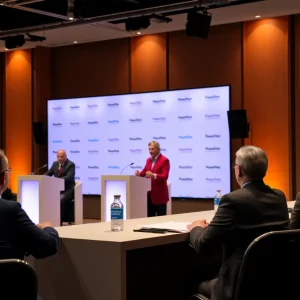Hoover Residents Raise Concerns Over City Finances
Hoover, Alabama—The financial landscape of the city has come under scrutiny following a comprehensive forensic audit, leading to a surge of concerns among residents about the state of the city’s finances. The audit was prompted by the city’s newly appointed Chief Financial Officer, Jennifer Cornett, earlier this year after she identified several irregularities in financial reporting.
Mayor Frank Brocato reassured the public that he has been in communication with state officials about the city’s financial issues and suggested that some of the unrest is politically motivated, given the upcoming city elections. “People raising a red flag are doing so for political purposes,” Brocato noted in a recent statement.
Details of the Forensic Audit
The forensic audit was carried out by Kroll, a well-known financial risk and investigative firm based in New York. Kroll has a storied career in handling complex financial matters, having previously assisted in uncovering hidden assets related to Saddam Hussein. Their primary objectives for Hoover included investigating irregular transactions, reconciling accounts, assessing financial report delays, and identifying any possible misappropriation of funds.
In a report presented to the Hoover City Council on August 19, Kroll’s representative, John Slavek, stated that no evidence of fraud or asset misappropriation was found. However, several significant problems were revealed that warrant attention:
- The Finance Department is understaffed, lacking crucial documented policies and training in essential functions.
- There were serious concerns regarding missing or destroyed financial records, including a critical audit “permanent file.”
- A total of 219 financial folders were deleted from the city’s server in July 2023, along with further deletions related to former CFO Tina Bolt’s devices.
Extent of Staffing and System Challenges
One of the audit’s more troubling findings revealed a “perfect storm” of events contributing to these issues. A mass exodus of key financial personnel occurred between late 2019 and early 2021, involving at least four significant finance staff who departed within a short timeframe and amid the implementation of a new financial software system, which was described as a “disaster” by Brocato.
This software debacle resulted in inaccurate W-2 reports submitted to the IRS, leading the city to now owe more than $200,000 in penalties. The audit pointed out that the Finance Department struggled with an overwhelming workload due to being short-staffed, which led to unreconciled accounts and errors, hampering financial operations.
Public Response and Political Implications
City Councilman Steve McClinton reported receiving 27 petitions from concerned citizens, reflecting a growing sentiment in the community for accountability in managing city finances. However, Brocato dismissed many concerns as politically motivated attacks against key city officials, asserting, “The city is in great financial shape.” He cited that Hoover’s regular auditors had given the city an “unmodified report” for fiscal 2023, a designation indicating satisfactory financial health.
Moving Forward
In response to these financial challenges, the City Council moved forward on August 29 by voting to create a new payroll manager position and remains in discussions about adding four additional financial positions. These changes aim to address staffing shortages and equip the Finance Department with the resources needed for improved financial management.
Mayor Brocato has also stated that he remains open to further investigations into the city’s financial practices, having already communicated with state authorities, including the attorney general. He expressed confidence that external scrutiny would conclude that the city’s practices are sound.
The unfolding situation in Hoover reflects a community actively engaged in maintaining its financial integrity while navigating the complexities posed by recent audit revelations. As city officials work to implement necessary changes, residents remain watchful of how these actions will impact their city’s future.

























